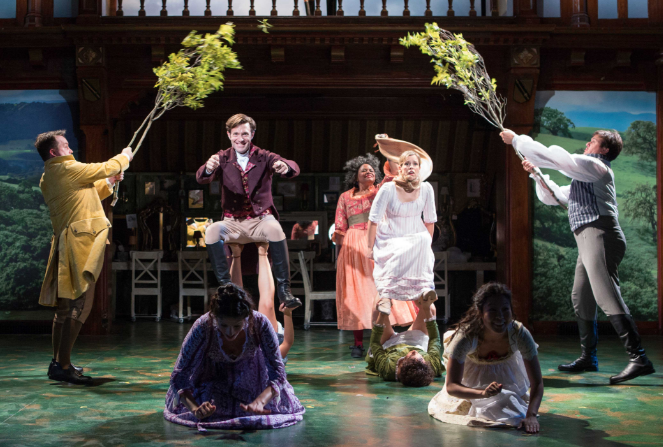In Jane Austen’s classic novel Sense and Sensibility, gossip flies across tearooms and parlors in regards to the futures of two sisters, Elinor and Marianne Dashwood. Left no inheritance by their late father, they are forced to live in the cramped Barton Cottage where romantic suitors and constant rumors abound. In Eric Tucker’s inventive theatre production of Sense and Sensibility, currently on show at the Folger Theatre, props and sets casted on wheels swirl around on stage just as fluidly and quickly as the chatter concerning the sisters’ love lives. Tucker’s creative direction and the versatile cast combine to present a charmingly lively version of Austen’s 200-year-old take on courtship in her time.
In this adaptation, written by Kate Hamill, this traditionally buttoned-up institution of English literature is opened up as a self-aware rumpus that amplifies the comedy in Austen’s work. From the very beginning, the production tries to get the audience to loosen up; the first scene depicts the whole cast partying to modern music before snapping to period era dance, providing a comedic contrast. Other tools are used to make the Georgian-era story more accessible and welcoming to the modern crowd: actors often change roles and costumes before the viewer’s eyes, and they even combine to form human props like beds and carriages. This all gives the production a scrappy, unintimidating nature despite the archaic society it plays out in.
The two actresses we see most on stage, Maggie McDowell and Erin Weaver, play Elinor and Marianne Dashwood, respectively. Though McDowell plays Elinor, the restrained sister whose desires are controlled by her “sense,” she manages to convey an earnest, authentic character whose emotional tumult can be felt despite her best attempts to conceal it. Her self-control is held in contrast with Weaver’s impulsive Marianne, the sister guided by her base “sensibilities.”
Caroline Stefanie Clay deserves special praise for her role as Mrs. Jennings, the matriarch of Barton Cottage and force behind much of the gossip storm that persists throughout the play. Clay’s Mrs. Jennings is a verbose, highly affected caricature of a woman that only grows more confident as the chaos of the play grows. Clay seems to revel in highlighting her character’s over the top nature, rolling her r’s with authority. Her character is aptly paired with an amiable companion, Michael Glenn’s Sir Middleton, who is more subdued yet still jovial in his own regard.
Jamie Smithson plays both the awkward Edward Ferrars and his alter ego of a brother, the wanton Robert Ferrars. The object of Elinor’s desires, Smithson’s Edward is insecure, overthinking, kind and witty, a source of many laughs especially when contrasted with the garrulous Robert. John Willoughby, Marianne’s romantic interest for most of the play, is played by Jacob Fishel. He portrays John as a slick manipulator that, in accordance with the theme of the play, differs greatly from Fishel’s other character, the clueless John Dashwood.
The way director Tucker plays with contrast, from the wildly opposite dual roles most cast members take to the fluid prop movement and exaggerated expressions that upturn this stoic gentry setting, is delightful. It makes for a production that, despite it’s length (2 and a half hours) and repetitive scenes of gossip, remains amusing and engaging throughout. The playfulness does regretfully obscure some of the nuances of the complex relationships in the story that are so interesting, but it is an understandable sacrifice that must be made for accessibility; all the major themes of social laws and balance are still there. Old fans of the story and newcomers alike will be captivated by this novel production that reveals a comedic side of Austen while still proving the timelessness of her characters.
If you go, be sure to claim the $10 student discount Folger offers for tickets bought through the phone or at the box office. Tickets are available here.





